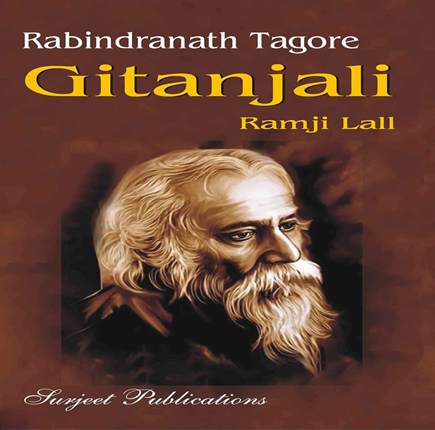The famous Gitanjali written by Rabindranath Tagore is a collection of poems. ―Gitanjali‖ is collection of poems which are originally in Bengali under the title ‘Prathana’ meaning Prayer but are later translated into English. It appears in the volume called ‘Naibebya’ in the year 1901. The poems of Gitanjali highlight simplicity of thoughts which are filled with Divine emotions. They are the thoughts about the offering of one own heart at the feet of God. No thought seems to be far away from Tagore‘s pen, from the famous Gitanjali ‘he focus on exploring Divine thought like a devotee finds his God, a seeker finds his master an explorer finds his destination, a lover find his beloved in this poems’. The main focus of his what to teach humans that service to mankind is service to God. He taught us that God lies in the poor and the wretched and we can see and feel God through our service to mankind. According to him man‘s life is a journey, and our destination is to reach the God. The only way to reach God is our kind/heartedness, generosity, love and help to our fellow human being.
Tagore that helps to develop Spiritualism and Humanism in one‘s heart and soul and service to mankind is the pure recognition of God. He also wants to highlight in his poems that human’s life shall be consider worth full and the main concern of one should be devotion towards their work and dedication towards goals. In Rabindranath Tagore‘s Gitanjali he explores the ideas that how he dreamed of a Nation which is free from all the evils and the thoughts that lead to destruction of oneself as well as for the whole nation. He prays to God that each human life shall be filled with happiness and peace and there shall be the spirit of brotherhood among the country men. He strongly criticized the feeling of fear in one‘s life and prays that a soul should be fearless and self-dignified.

Where the mind is without fear
Where the mind is without fear
and the head is held high,
where knowledge is free.
Where the world has not been broken up into fragments by narrow domestic walls.
Where words come out from the depth of truth,
where tireless striving stretches its arms toward perfection.
Where the clear stream of reason has not lost its way into the dreary desert sand of dead habit.
Where the mind is led forward by thee into ever widening thought and action.
In to that heaven of freedom, my father,
LET MY COUNTRY AWAKE!
Summary of the poem
It is one of the most popular and best known poems in the anthology called Gitanjali which was published in the year 1912 and won the prestigious Nobel Prize for literature in 1913. In the very first line of the poem ― “Where the mind is without fear”, the poet prays to the Almighty that his country man should be free from any oppression, where no fear is bounded with any fourth compulsion and every head is held high with dignity and respect. He wishes of a country where every person should be fearless and the sense of self dignity in filled in once heart. Then he dreams of a nation where knowledge must be free for everyone. He also believes that there should be no restrictions for spreading knowledge on the basis of cast or class and every citizen shall be allow acquiring it. In the ongoing line he talks about the power of unity and desires unity not only for his country man but should be world wise. There should be no discrimination on the basis of cast, creeds, color, religion, as well as superstition should not be promoted to divide people and break the unity. Then he dream of truthful Nation where words should, come out from the heart of oneself. He motivates the reader that everyone should work so hard that they can achieve their goal with perfection. People should not be lazy and ignore their work and one must gain the spirit of dedication towards their job or work. Tagore very beautifully compares Reason or Logical thinking with ‘Clear Stream’. Then he compares ‘Dreary Desert’ with ‘Dead Habits’. Then he conveys to the reader that people should not believe blindly on negative aspect of life as well as baseless thoughts. From his poem he wants the reader to Good Bye the negative thinking or the thoughts that demotivate them as well as leads to a falling apart and should promote one thought that should be monitored by rational or positive thinking. In the ongoing line, he wishes the country men to be progressive and broad minded and one shall have the ability to do something extraordinary and overcome the narrowness of mind. Then he comes to the finale line or the poem in which Tagore wants to convey a message to the reader he is praying the Almighty God to awake his countrymen that they come out from the darkness, disunity and all evil traits that one have in their heart.
In this concluding line he addresses “God as Father” and wants the people shall be free from heart so that they can attain freedom. He also wishes to lift up his country to such height where freedom would be realized in best form. Thus we can conclude that from this poem Tagore very beautifully and gracefully covey the message to his reader that one must have the spirit of fearlessness and a broad minded thinking in our heart and mind. He also discourages the superstition thoughts and believes that ultimately leads to division in the worldwide. He Prays to the Almighty that knowledge can be free from everyone and each head is held high with dignity and proud.




0 Comments